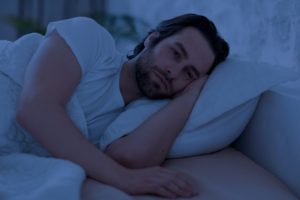
The Centers for Disease Control and Prevention recommends at least 7 hours of quality sleep every night for adults; however, 1 in 3 don’t get the rest they need. If you’re not getting enough sleep, you likely get up in the morning feeling less than your best. Tossing and turning may not be from a bad mattress or drinking too much caffeine before bed. There might be an underlying issue causing the problem. Insomnia and sleep apnea are two common culprits behind poor sleep quality. Here’s what you need to know to determine if you need insomnia or sleep apnea treatment in Greenfield.
Insomnia Vs. Sleep Apnea
Some people fall asleep as soon as their head hits their pillow, but sleep doesn’t come as easily for others. Many factors contribute to sleeplessness, but obstructive sleep apnea and insomnia are often the cause. Insomnia refers to the inability to fall or stay asleep while obstructive sleep apnea results in interruptions in breathing. Although they can both cause daytime fatigue, only one has potentially life-threatening complications.
Insomnia
Insomnia is a disorder that causes reoccurring sleeplessness. It’s normal to have a bad night occasionally, but insomnia can occur 3 or more times per week. The ongoing inability to fall asleep can vary from a few weeks to multiple months. Typically, resolving the reason for the sleeplessness can help you get the rest you need, like treating chronic pain, reducing stress, or treating gastroesophageal reflux.
Sleep Apnea
Sleep apnea is more serious. It’s commonly caused by an obstruction in the upper airway that restricts breathing. The soft tissues in the back of the mouth and throat can collapse to block the airway, leading to hundreds of interruptions in breathing each night. Each pause can last for a minute or longer.
Every time you stop breathing, your brain jolts you awake from lack of oxygen. Although you may not be aware of the awakenings, they interrupt your sleep cycle, which can eventually lead to sleep deprivation. Unfortunately, the risks don’t stop there. The recurring depletion of oxygen can significantly increase your risk of potentially deadly health issues, like cardiovascular disease. The only way to maintain an unobstructed airflow is with sleep apnea therapy.
Breathe Better and Sleep Soundly
A CPAP is a machine used to treat sleep apnea. It’s a tried-and-proven solution to keep the airways open using a steady stream of air pressure that’s delivered through a mask worn over the nose. However, there is another solution.
An oral appliance is patient-preferred because it’s convenient and comfortable. The custom-fit device repositions your lower jaw to prevent the soft tissues from blocking the airway. After just one night, you’ll breathe better to get the rest you need to feel your best.
About Dr. Jenna Bagley
Dr. Jenna earned her dental degree from the Tufts University School of Dental Medicine before continuing her education in sleep apnea. She specializes in customized sleep apnea therapy to promote each patient’s health and quality of life. If you have sleep apnea, contact our office today to schedule your consultation for oral appliance therapy.


